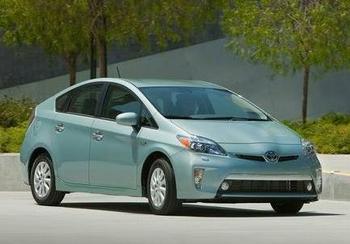
NEW YORK, New York, June 13, 2013 (ENS) – Riding on a wave of green innovations, automotive brands dominate the top 10 in this year’s Best Global Green Brands report, released Wednesday by the world’s largest brand consultancy – Interbrand.
Japanese automakers rate high – Toyota retains its #1 position for the third year, while Nissan accelerates into fifth place this year, moving up 16 places from #21 on last year’s Green Brands list.
Of the top 10 Green Brands slots – half of them are filled by automakers – all Japanese with the exception of the German automaker Volkswagen in the seventh slot.

Automakers that made the top 100 list of green brands are: Toyota, Ford, Honda, Nissan, Volkswagen, BMW, Mercedes-Benz, Hyundai and Kia.
“The top Best Global Green Brand for the third year in a row, Toyota is losing ground to auto rivals Nissan, Ford, and Honda in overall environmental sustainability performance, but leads them in perceived performance thanks to a single sub-brand: the Prius, with more than 2.9 million models sold worldwide in 2012 – 1.2 million in the U.S. alone,” writes Interbrand in the report.
Interbrand’s 2013 Best Global Green Brands report examines the gap that exists between a corporation’s environmental practices and consumers’ perceptions of those practices.
Interbrand runs its green brands evaluations on the premise that “the Best Global Green Brands lie at the point where perception and performance meet,” the company says on its website.
So the company’s methodology is based on assessing both market perception and actual environmental performance.
Said David Pearson, Deloitte’s Global Sustainability Leader, “Sustainability continues to assert itself on the business agenda. Customers and stakeholders are holding businesses more and more accountable for sustainability performance, and businesses are working hard to ensure that their external perception reflects their internal efforts.
“Leading global brands are thus showing increased focus and innovation in the sustainability realm,” said Pearson, “leading to improved programs and reporting.”
When identifying the top 50 Best Global Green Brands each year, Interbrand starts with the 100 brands that make up its annual Best Global Brands report.
Interbrand then conducts consumer research to capture public perception of the brand’s sustainable or green practices.
Then Interbrand compares that perception to publicly available, environmental sustainability performance data gathered by Deloitte.
“What makes the annual Best Global Green Brands report unique and valuable is that it examines performance and perception in action,” said Jez Frampton, Global Chief Executive Officer of Interbrand.
“The report provides leading brands with the insights they need to develop robust strategies – strategies that will not only drive their businesses forward, but also have a positive impact on the environment and communities in which those businesses operate,” Frampton said.
“Nissan is becoming increasingly committed to developing and promoting its green credentials,” said Interbrand in the report.
In February, Nissan announced that 50,000 LEAFs had been produced worldwide, making the LEAF the most widely sold electric passenger car of all time. Nissan plans to cut 15 percent of vehicle weight in a LEAF starting in 2017.
Reducing vehicle weight through smarter design and material selection, utilizing renewable and sustainable materials, and turning to alternative fuels are just a few of the ways Nissan is making strides in the green arena, proving that sustainability can lead to profitability.
Nissan has joined forces with Daimler and Ford to develop a line of affordable fuel-cell cars that are scheduled to roll out in 2017.
Moving up 11 slots to 32nd place on this year’s Best Global Green Brands list, UPS, the multi-billion-dollar delivery service, recently announced one of the largest single deployments of zero-emission vehicles in the world. This 100-strong fleet will reduce fuel consumption by roughly 126,000 gallons per year, the company calculates.
UPS shows its green innovations with route optimization software, carbon-neutral shipping option, electronic commercial invoicing and eco-friendly packaging.
Copyright Environment News Service (ENS) 2013. All rights reserved.
© 2013, Environment News Service. All rights reserved. Content may be quoted only with proper attribution and a direct link to the original article. Full reproduction is prohibited.
